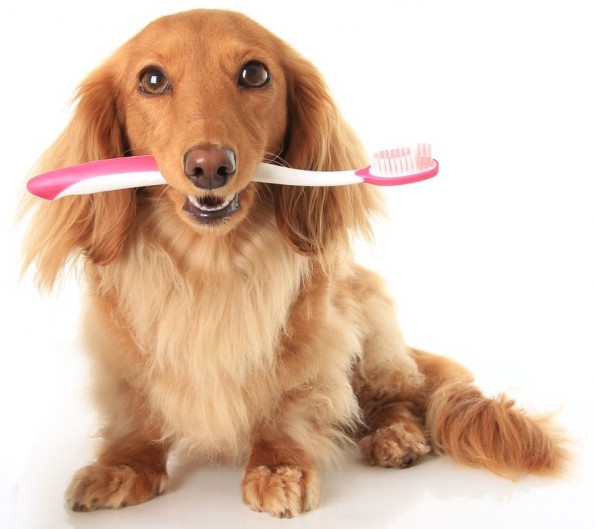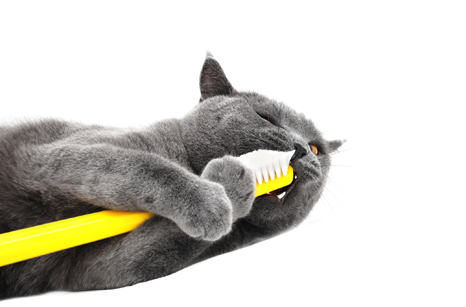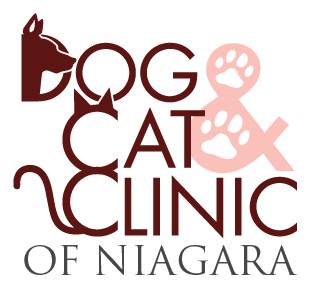
The importance of oral health.
At the Dog & Cat Clinic of Niagara in St. Catharines, Ontario, we believe that proper care of your pet’s teeth and gums is important for maintaining their overall health. There can be significant dental disease present but no outward signs. This is why it is important to include an oral exam yearly as part of your pets wellness check-up. Schedule your pet’s dental exam with our Niagara veterinary hospital today! We can also show you how to brush your cat or dog’s teeth, and recommend foods and treats that will help combat plaque and tartar buildup.
To shed some light on dentistry in cats and dogs here are some answers to a few Frequently Asked Questions:
What are some clues that my cat of dog has oral health issues?
These clues may include but are not limited to:
- Foul smelling breath (halitosis)
- Decreased appetite
- Drooling
- Poor grooming activity
- Low activity level
- Chattering teeth
- Changes in eating or chewing habits
- Pawing at the face
- Loose teeth
- Behaviour changes
There may be other causes of these signs but a complete physical exam, including an oral assessment, will help to determine the cause of the troubles.
My cat/dog is young. Could he/she need a dental scaling already?
Most cats and dogs have some form of dental disease at just a few years of age. This process generally begins with an accumulation of soft plaque on the teeth and this inflames the gums. Soft plaque can become calcified forming tartar. Gum inflammation, also known as “gingivitis”, is evident if the gums are red, bleeding, and/or if your pet has persistent bad breath. Gingivitis also leads to what is termed “periodontitis” or the inflammation of the tissues around the teeth. Just like us, poor oral health can also affect many other parts of our body. With infection of the teeth or gums, bacteria can enter the blood stream and lodge in the kidneys or on the valves of the heart—thus causing disease in those organs.
My veterinarian suspects my dog/cat has a cavity. What does that mean?
Many cats and dogs suffer from cavities. Cats suffer from unique cavities at or below the gum line, these are called Feline Odontoclastic Resorptive Lesions (FORL—for short). It is best to have your pet checked regularly for cavities and keep uo their dental hygeine.
What happens when my dog or cat undergoes a dental scaling or oral surgery?
This procedure is typically an all-day affair. Your pet will be admitted to the veterinary hospital in the morning, fasted. We begin with another brief physical  exam and blood screening tests. The purpose of these tests is to evaluate the dog or cat’s condition and organ function—increasing the safety of the anesthesia. During the surgery, your pet will receive IV fluids and all vitals will be monitored by our Registered Veterinary Technician. Our expert Veterinarian will closely examine the mouth, scale the teeth to remove plaque and tartar and polish your cat’s teeth to smooth out any scratches in the enamel. In conditions of advanced periodontal disease, painful, decaying and broken teeth are extracted. Your pet will then be given an injection for pain relief and an antibiotic course. If there were any extractions, further pain medications will be dispensed. When surgery is complete the dog or cat will remain in our veterinary hospital for the duration of the day to recover (possibly overnight). When it is time for your pet to go home, we will outline what to watch for during the healing process and discuss recommendations to maintain a healthy mouth!
exam and blood screening tests. The purpose of these tests is to evaluate the dog or cat’s condition and organ function—increasing the safety of the anesthesia. During the surgery, your pet will receive IV fluids and all vitals will be monitored by our Registered Veterinary Technician. Our expert Veterinarian will closely examine the mouth, scale the teeth to remove plaque and tartar and polish your cat’s teeth to smooth out any scratches in the enamel. In conditions of advanced periodontal disease, painful, decaying and broken teeth are extracted. Your pet will then be given an injection for pain relief and an antibiotic course. If there were any extractions, further pain medications will be dispensed. When surgery is complete the dog or cat will remain in our veterinary hospital for the duration of the day to recover (possibly overnight). When it is time for your pet to go home, we will outline what to watch for during the healing process and discuss recommendations to maintain a healthy mouth!
How do I brush my dog/cat’s teeth?
With patience and persistence it is often possible to teach yourself and your pet how to brush his/her teeth.
- This video, from the Cornell Feline Health Centre, takes you step by step through learning this process. Have a look!
- This video found under Helpful Tips for Cats on our website, also demonstrates how to brush your cat’s teeth.
Is there a food that will help my dog/cat’s teeth?
Not only do we believe in the famous quote “You are what you eat,” but we would argue that when it comes to oral health “You are HOW you eat!” Cats and dogs can greatly benefit from eating a prescription dental diet that is certified by the Veterinary Oral Health Council. Prescription dental diets have two key features: their shape and their plaque/tartar fighting ingredients. The shape and structure is very large and of a specific density, which encourages the pets to do plenty of chewing, in turn causing a scrubbing action. This means that as the pet is biting it, the entire tooth surface is scrubbed by the kibble before it breaks. By eating this food cats and dogs are brushing their own teeth! The plaque reducing ingredients make sure that accumulation of plaque and tartar are reduced and that any teeth missed by the scrubbing action are taken care of. Not all dental diets are created equal so be sure to look for the attached logo. Remember to always transition gradually when starting a new food and make sure that a change to dental diet is most appropriate for your pets health – contact your local Veterinarian in Niagara, St Catharines and Welland.
We hope this answers some of your questions but, as always, we are here to help. Call our expert veterinary staff with your questions.
For more information on Feline and Canine Dentistry search “Dental” on our Educational Articles page.
